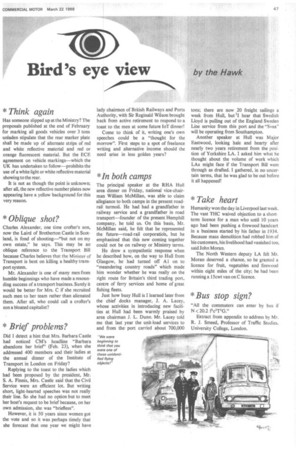*In both camps
Page 49

If you've noticed an error in this article please click here to report it so we can fix it.
The principal speaker at the RHA Hull area dinner on Friday, national vice-chairman William McMillan, was able to claim allegiance to both camps in the present roadrail turmoil. He had had a grandfather in railway service and a grandfather in road transport—founder of the present Hemphill company, he told us. On this basis, Mr. McMillan said, he felt that he represented the future—road-rail corporation, but he emphasized that this new coming together could not be on railway or Ministry terms.
He drew a sympathetic response when he described how, on the way to Hull from Glasgow, he had turned off Al on to "meandering country roads" which made him wonder whether he was really on the right route for Britain's third trading port, centre of ferry services and home of great fishing fleets.
Just how busy Hull is I learned later from the chief docks manager, J. A. Lacey, whose activities in introducing new facilities at Hull had been warmly praised by area chairman J. L. Dunn. Mr. Lacey told me that last year the unit-load services to and from the port carried about 700,000
tons; there are now 20 freight sailings a week from Hull, but I hear that Swedish Lloyd is pulling out of the England Sweden Line service from this port and the "Svea" will be operating from Southampton.
Another speaker at Hull was Major Eastwood, looking hale and hearty after nearly two years retirement from the position of Yorkshire LA. I asked him what he thought about the volume of work which LAs might face if the Transport Bill went through as drafted. I gathered, in no uncertain terms, that he was glad to be out before it all happened!












































































































